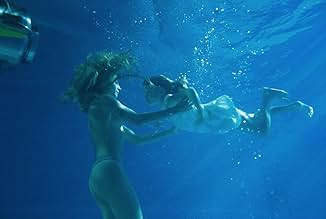Varias vidas coinciden en una isla, conectadas por un autor cuya novela se entrelaza con su propia vida.Varias vidas coinciden en una isla, conectadas por un autor cuya novela se entrelaza con su propia vida.Varias vidas coinciden en una isla, conectadas por un autor cuya novela se entrelaza con su propia vida.
- Premios
- 11 premios y 18 nominaciones en total
María Álvarez
- Enfermera
- (as María Alvarez)
Javier Coromina
- Camarero Chiringuito
- (as Javier Corominas)
Alesandra Álvarez
- Luna 1 año
- (as Alesandra Alvarez)
José Ferreira
- Emplastro
- (sin acreditar)
Reseñas destacadas
I found this film absolutely terrific. Ik know there's a lot of sex in it and yes, there are a lot of suspicious coincidences, but I looked past that.
For starters, I loved the story, it wasn't boring at all, despite what some may say. It was a sort of twisty fairytale to me, just like 'Los Amantes del Circulo Polàr' was. I love good fairy tales!
The acting was very good by most actors (I love you Najwa!), and good by the others. Even the girl that played Luna was convincing.
The film has a lot of explicit scenes (sexual and non-sexual) but besides from that Médem accomplishes to put a lot of suggestion in it (sexual and non-sexual). If you watch it attentively and past merely what you see, you will notice the subtlety of the characters and story.
Last of all i would like to say that the English title (Sex and Lucia) is an abomination to the original title (Lucia y el Sexo). The word are the same, but the word order has flipped, which gives the title a whole other meaning, to my opinion. The film is about Lucia and the meaning sex has in her life and the life of others. It is not about sex and the way Lucia handles with it. The meaning of film titles is often lost in translation (no pun intended). Why can't American (and other) people keep the original title? We can in Belgium.
A la proxima
For starters, I loved the story, it wasn't boring at all, despite what some may say. It was a sort of twisty fairytale to me, just like 'Los Amantes del Circulo Polàr' was. I love good fairy tales!
The acting was very good by most actors (I love you Najwa!), and good by the others. Even the girl that played Luna was convincing.
The film has a lot of explicit scenes (sexual and non-sexual) but besides from that Médem accomplishes to put a lot of suggestion in it (sexual and non-sexual). If you watch it attentively and past merely what you see, you will notice the subtlety of the characters and story.
Last of all i would like to say that the English title (Sex and Lucia) is an abomination to the original title (Lucia y el Sexo). The word are the same, but the word order has flipped, which gives the title a whole other meaning, to my opinion. The film is about Lucia and the meaning sex has in her life and the life of others. It is not about sex and the way Lucia handles with it. The meaning of film titles is often lost in translation (no pun intended). Why can't American (and other) people keep the original title? We can in Belgium.
A la proxima
. . .and it's not really even about Lucia! Lucia y el Sexo is actually about Lorenzo, Lucia's novelist boyfriend, and the consequences of a sexual encounter he had in the past which has led to a catastrophic event in his life. It's a languid and tempestuous poem of a movie, told in a non-linear way by the extremely ambitious Julio Medem.
As a novelist myself, I deeply related to Lorenzo's blurring of reality and imagination. Your characters MUST be real to you in order for them to live and breathe on the page, and so much of your own life goes into the characters that the lines of course do blur. And then there's the subconscious, which cannot differentiate between fantasy and reality. Medem understands all this very well, and his depiction of it is remarkable.
The title, I believe, refers to Lorenzo's past (The Sex and what happened as a result of it), and his present (Lucia). Paz Vega and Tristan Ulloa are stunning as the two leads - Vega with her fierce intelligence and Ulloa with his tormented vulnerability. I would have given this film a 10 if it hadn't been for the fact that the most pivotal scene is shot in an incredibly vague manner, which left me confused as to what had actually happened until much later in the movie, but it is a brilliant and heartfelt experience nonetheless.
As a novelist myself, I deeply related to Lorenzo's blurring of reality and imagination. Your characters MUST be real to you in order for them to live and breathe on the page, and so much of your own life goes into the characters that the lines of course do blur. And then there's the subconscious, which cannot differentiate between fantasy and reality. Medem understands all this very well, and his depiction of it is remarkable.
The title, I believe, refers to Lorenzo's past (The Sex and what happened as a result of it), and his present (Lucia). Paz Vega and Tristan Ulloa are stunning as the two leads - Vega with her fierce intelligence and Ulloa with his tormented vulnerability. I would have given this film a 10 if it hadn't been for the fact that the most pivotal scene is shot in an incredibly vague manner, which left me confused as to what had actually happened until much later in the movie, but it is a brilliant and heartfelt experience nonetheless.
This is really one of the better constructed movies I've seen in a while.
Both the storytelling and style of the movie can be called unique.
It starts mixing reality with fiction and its hard to tell what really happened and what didn't. It features lots of 'what-if' themes and the story is being rewritten in the characters mind, also with lots of symbolism, mainly with the moon and the water. It doesn't make this the most accessible movie but then again, you don't ever have to watch an European movie for its accessibility.
Things start off quite slow but as the story develops the story gets more and more complicated and non-linear, when the line between fiction and reality gets blurred more and more. It does make the movie hard to follow at times but it at the same time makes the movie more interesting to watch and enables everybody start to define things on their own. You of course have to be open to these sort of movies though. Also the very explicit nudity isn't just for everybody.
Sex plays a key part in the movie. It helps to tell the story and plays a significant role in the story lines and help to indicate when things are truth or fiction. Never before has sex played such a key part in the storytelling of a movie.
This movie is always presented as a Paz Vega but this movie it's main character is in my opinion played by Tristán Ulloa. He's the writer, were the entire movie involves around. The story is mostly set inside his head. The three main actors (Paz Vega, Tristán Ulloa, Najwa Nimri) of the movie are really good and carry the entire movie.
Visually the movie is really great and impresses just as much as the storytelling of the movie. The camera-work and colors are really great and create a very unique atmosphere for the movie. It helps to make "Lucía y el sexo" an even bigger and more enjoyable movie to watch, visually.
Those who are open for an unique, one of a kind, unusual movie experience, will surely be delighted with this magnificent beautiful looking and constructed movie.
9/10
http://bobafett1138.blogspot.com/
Both the storytelling and style of the movie can be called unique.
It starts mixing reality with fiction and its hard to tell what really happened and what didn't. It features lots of 'what-if' themes and the story is being rewritten in the characters mind, also with lots of symbolism, mainly with the moon and the water. It doesn't make this the most accessible movie but then again, you don't ever have to watch an European movie for its accessibility.
Things start off quite slow but as the story develops the story gets more and more complicated and non-linear, when the line between fiction and reality gets blurred more and more. It does make the movie hard to follow at times but it at the same time makes the movie more interesting to watch and enables everybody start to define things on their own. You of course have to be open to these sort of movies though. Also the very explicit nudity isn't just for everybody.
Sex plays a key part in the movie. It helps to tell the story and plays a significant role in the story lines and help to indicate when things are truth or fiction. Never before has sex played such a key part in the storytelling of a movie.
This movie is always presented as a Paz Vega but this movie it's main character is in my opinion played by Tristán Ulloa. He's the writer, were the entire movie involves around. The story is mostly set inside his head. The three main actors (Paz Vega, Tristán Ulloa, Najwa Nimri) of the movie are really good and carry the entire movie.
Visually the movie is really great and impresses just as much as the storytelling of the movie. The camera-work and colors are really great and create a very unique atmosphere for the movie. It helps to make "Lucía y el sexo" an even bigger and more enjoyable movie to watch, visually.
Those who are open for an unique, one of a kind, unusual movie experience, will surely be delighted with this magnificent beautiful looking and constructed movie.
9/10
http://bobafett1138.blogspot.com/
This movie in my view is not understandable without any notion of the 'soul', whose movements are made visible by magnificent underwater shots. The sexual scenery functions not only as entrance to the story; I think Medem really wanted to depict something like 'the ultimate sex' both as experience and as ultimate, divine ideal, something like Goethes 'eternal feminine.' As something to strive for, it can deeply affect our lives by giving it the splendour we need to keep it worthwhile, even if we fail. At the same time, it is also a power deep down, a dark shadow that haunts us. It's for us to see, to accept, and to decide: do we want to go to our island and unite the two, as Lucia does? In that case, we might see that in the end our stories come true as well, be it by breaking in in the middle.
The question I asked myself after watching the movie for the third time was: where exactly is this 'middle' of it? It seems to me that it's around the scene where Elena is walking through Madrid with Luna in her baby carriage, while passing the apartment of Lucia and Lorenzo. From then on, the decisions made by the novelist - like the shivery death of his child - are such that there is no way back. Lorenzo, Lucia and their relationship are too heavily shaken up. Both have to get into a new reality which can transform their personalities; to both, this means a form of dying and leaving their old personalities behind. They surely resist this, especially Lorenzo; but also he has to put himself at risk, following the demands of his 'blood', that is, of his sex, death and rebirth. And there the story takes over the initiative from the writer, who himself is thrown into it - in the middle, where he leaves his home and runs into his 'accident'. Exactly that scene is not shown - it's the hole in the middle, through which the old reality passes into the new.
For me, this movie is a small masterpiece, which shows how film and literature can work together, and how more powerful ideas about ourselves are then the circumstances we are put into. The 'form' of the persons is therefore changeable: like Lorenzo during the last Island episode has 'changed' into Carlos. As the 'transformed' Lorenzo turns up on the island, with his distress and his love for both Elena and Lucia, 'Carlos' is no longer necessary and the women can leave him behind. The fact that Elena is eventually able to weep, marks the acceptance of her loss, which 'naturally' returns her child to her from the middle of the picture again.
The question I asked myself after watching the movie for the third time was: where exactly is this 'middle' of it? It seems to me that it's around the scene where Elena is walking through Madrid with Luna in her baby carriage, while passing the apartment of Lucia and Lorenzo. From then on, the decisions made by the novelist - like the shivery death of his child - are such that there is no way back. Lorenzo, Lucia and their relationship are too heavily shaken up. Both have to get into a new reality which can transform their personalities; to both, this means a form of dying and leaving their old personalities behind. They surely resist this, especially Lorenzo; but also he has to put himself at risk, following the demands of his 'blood', that is, of his sex, death and rebirth. And there the story takes over the initiative from the writer, who himself is thrown into it - in the middle, where he leaves his home and runs into his 'accident'. Exactly that scene is not shown - it's the hole in the middle, through which the old reality passes into the new.
For me, this movie is a small masterpiece, which shows how film and literature can work together, and how more powerful ideas about ourselves are then the circumstances we are put into. The 'form' of the persons is therefore changeable: like Lorenzo during the last Island episode has 'changed' into Carlos. As the 'transformed' Lorenzo turns up on the island, with his distress and his love for both Elena and Lucia, 'Carlos' is no longer necessary and the women can leave him behind. The fact that Elena is eventually able to weep, marks the acceptance of her loss, which 'naturally' returns her child to her from the middle of the picture again.
This is one of the better structured movies ever put to screen. It's as complex as Lynch's Lost Highway, but that only adds to the experience. A non-linear structure (in time and space) is applied and Lucia y el Sexo blurs the line between reality and imagination.
Basically, it's like Mulholland Drive: Most of what we see is a dream, imagination. Only a relatively small part did really happen. But this goes one step further: What part is in the eye of the beholder here, because little clues are given so the mystery format is only used to keep us entertained at a basic level.
A writer is the center here. Some parts of his life are probably true (trouble at home, sickness), others are ambiguous, others are certainly imagined. He is in the meta-story, but also places himself in threads in the other stories that come from his imagination. His imagination is formed by applying smaller and larger events (meeting a person at a party, seeing someone in front of the house) in his personal life to his fantasies. His erotic fantasies explain the title, as sex is one of the characters of the story. One of the story lines is again about his script read on the island by one of his imagined characters. Writing the story and telling the story is done simultaneously. As he becomes sick, the characters become helpless in the story. Overall it helps a lot if you keep imagining that you're watching imagined characters being manipulated by the writer. This combines meta-story and story, real with imagination, weaving several threads in a complicated web of story lines. In the end, it is made clear that the story doesn't end but starts again halfway, giving further evidence that viewers can use their imagination at random on this and create their own story out of it.
The meta-story is interesting, but by mixing it with the story itself we see the real story as what it is, a writing trick with imagined characters. That unfortunately diminishes the emotions a movie tries to convey. We're merely watching how a movie is structured, with the imagined story not having the usual dramatic impact.
It's remarkable that so many people are offended by the sex scenes, as it's already in the title. Do they also complain about the presence of aliens in Alien? I found the sex scenes to be made with some honesty; and at least they didn't even shy away of male nudity.
Basically, it's like Mulholland Drive: Most of what we see is a dream, imagination. Only a relatively small part did really happen. But this goes one step further: What part is in the eye of the beholder here, because little clues are given so the mystery format is only used to keep us entertained at a basic level.
A writer is the center here. Some parts of his life are probably true (trouble at home, sickness), others are ambiguous, others are certainly imagined. He is in the meta-story, but also places himself in threads in the other stories that come from his imagination. His imagination is formed by applying smaller and larger events (meeting a person at a party, seeing someone in front of the house) in his personal life to his fantasies. His erotic fantasies explain the title, as sex is one of the characters of the story. One of the story lines is again about his script read on the island by one of his imagined characters. Writing the story and telling the story is done simultaneously. As he becomes sick, the characters become helpless in the story. Overall it helps a lot if you keep imagining that you're watching imagined characters being manipulated by the writer. This combines meta-story and story, real with imagination, weaving several threads in a complicated web of story lines. In the end, it is made clear that the story doesn't end but starts again halfway, giving further evidence that viewers can use their imagination at random on this and create their own story out of it.
The meta-story is interesting, but by mixing it with the story itself we see the real story as what it is, a writing trick with imagined characters. That unfortunately diminishes the emotions a movie tries to convey. We're merely watching how a movie is structured, with the imagined story not having the usual dramatic impact.
It's remarkable that so many people are offended by the sex scenes, as it's already in the title. Do they also complain about the presence of aliens in Alien? I found the sex scenes to be made with some honesty; and at least they didn't even shy away of male nudity.
¿Sabías que...?
- CuriosidadesSome of the most sexual explicit content was made by doubles, not by the main actors.
- PifiasA full moon between two buildings is shown during midday when Lorenzo meets his daughter Luna for the first time - which is astronomically impossible.
- Créditos adicionalesCredits scroll in the opposite direction.
- Versiones alternativasThe US cut removes most of the frontal nudity and runs approximately 2 minutes shorter.
- ConexionesFeatured in Brows Held High: Room in Rome (2013)
- Banda sonoraUn Rayo de Sol
Written by Daniel Vangarde (as Vangarde), Claude Carrère and Amado Jaén (as Jaen)
(c) Bleu Blanc Rouge Editions Soc - Editions Productions Zagora
Ediciones Musicales Clipper's, S.L.
Selecciones populares
Inicia sesión para calificar y añadir a tu lista para recibir recomendaciones personalizadas
- How long is Sex and Lucía?Con tecnología de Alexa
Detalles
- Fecha de lanzamiento
- Países de origen
- Sitio oficial
- Idiomas
- Títulos en diferentes países
- Sex and Lucía
- Localizaciones del rodaje
- Empresas productoras
- Ver más compañías en los créditos en IMDbPro
Taquilla
- Recaudación en Estados Unidos y Canadá
- 1.594.779 US$
- Fin de semana de estreno en EE. UU. y Canadá
- 47.591 US$
- 14 jul 2002
- Recaudación en todo el mundo
- 7.640.680 US$
- Duración2 horas 8 minutos
- Color
- Mezcla de sonido
- Relación de aspecto
- 2.35 : 1
Contribuir a esta página
Sugerir un cambio o añadir el contenido que falta

Principal laguna de datos
What is the streaming release date of Lucía y el sexo (2001) in Brazil?
Responde


























